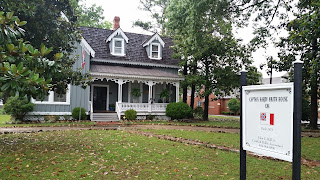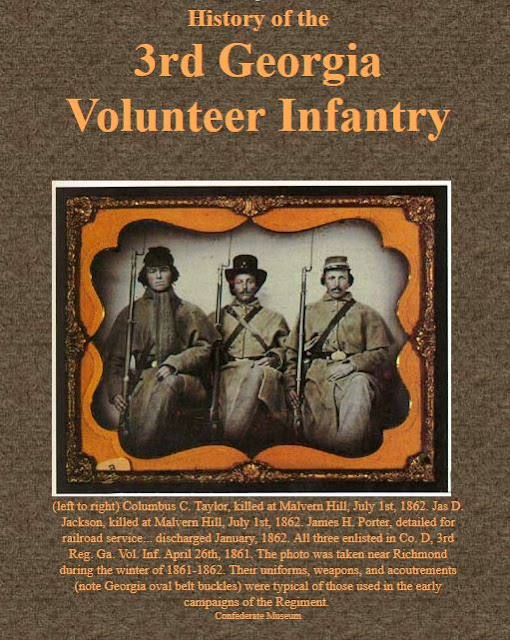Above the High Water Mark is book based on 47 letters from the collection of letters housed at the University of Georgia Special Collections Library. The story told in this book tells the tale of the Old South and Reconstruction.
The reader will read the story of a lawyer who married before the War between the States and had a son. Once war broke out Corker joined the 3rd Georgia Regiment. The 3rd Georgia's history is detailed from the beginning of war to the end.
Corker was at the Battle of Sharpsburg. After this battle he writes he wife telling of his sword being shot in two at bloody lane while he stands for an hour with no weapon not wanting to be called a coward back home. Less than a year later on July 2, 1863, Corker is captured at Gettysburg. A letter to Corker's wife signed by Robert E. Lee details the last position Corker was seen.
Corker led the 3rd Georgia under Wright's Brigade which included the 2nd, 22nd and 48th Georgia. Wright's charge is detailed in three different accounts including Wright's own report. This charge broke the Union line and was the furthest advance; Hence the title of the book.
Corker is sent to Johnson's Island Yankee prison which was close to Sandusky, Ohio. The majority of letters were written from prison. These letters detail prison life, his interaction with other prisoners and the progression of the war to its end.
After the war, Corker is elected to the 41st Congress and serves one term. His election was contested and the testimony during his term in office gives a keen insight into Reconstruction in Georgia with Union Troops Occupying the State.
Below is the back cover of the book showing the key items covered.
Order your copy now for $20 plus $2 shipping:
Blockade Runner Publishing
307 West Gaines Street
Dublin, Georgia 31021
Email:brunnerpublishing@gmail.com
Payment accepted via paypal
jchjrcpa@bellsouth.net
Order directly from Amazon or Create Space via the links below
https://www.amazon.com/dp/1537459228
https://www.createspace.com/6546848
The following review was written by Scott Mingus, Sr.
Scott Mingus is a scientist and executive in the global paper industry, The York, Pa., resident has written twelve Civil War books. . His great-great-grandfather was a 15-year-old drummer boy for the 51st Ohio Infantry, and other family members fought in the Army of the Potomac at Antietam and Gettysburg.
Stephen A. Corker was an attorney, judge, and slaveholder in southeastern Georgia before the Civil War. In April 1861, he enrolled in the Burke Guards, Company A, 3rd Georgia Infantry and became an orderly sergeant. He wrote a lengthy series of letters throughout the war to his beloved wife, starting with a note to her from the regiment's campsite near Roanoke Island through February 1865 when he was a prisoner of war being held in the Johnson's Island prison camp in the midst of frigid Lake Erie. He had been taken prisoner in July 1863 during the battle of Gettysburg and was confined the rest of the war.
Author John C. Hall. Jr. has assembled Corker's letters in a new book, with annotations and additional information to help the reader understand the context and background for each letter, as well as the specific people mentioned in them. He has divided them in distinct sections, beginning with a single pre-war love letter to his future wife. Section B includes a series of seven letters Corker, nicknamed "Fes," wrote before he was captured in southern Pennsylvania. One of his early letters is to Governor Joe Brown of his native Georgia asking for a commission when his original term of enlistment expired on May 1, 1862. He would eventually indeed receive his desired rank of captain. Another letter covers the fighting at Sharpsburg/Antietam. "I went thru the Maryland Campaign & never got hurt tho my sword was shot in two at the battle of Sharpsburg," he informed his wife. Corker added, "I can out march any man we got but it has broke me down. I am very thin but my gen'l health is good."
Hall's next section, C, covers two letters sent to his family members after Captain Corker was taken prisoner at Gettysburg during the July 2, 1863, attack of Wright's brigade that briefly penetrated the Union center before being repulsed. On August 18, army commander Gen. Robert E. Lee wrote brief, but sympathetic letter to Mrs. Corker in which he stated, "I sympathize deeply with you in your anxiety and regret that I can do so little to relieve it." One of the “high points” in the book is the location that Lee states in this letter that Corker was last seen. “Marse Robert” wrote, “when last seen was standing near a piece of the enemy’s artillery where the fire was very severe. It is not known whether he was killed or wounded. I hope he is living and may long be spared to his family and the country.”
In section D, Hall presents Corker's letters from captivity. Corker was transported from Gettysburg to Fort Delaware before being forwarded to Johnson's Island near Sandusky, Ohio. Over the next year and a half, he sent his wife several letters with updates on life in prison, which other soldiers had perished, and his thoughts on the war. Hearing news of Sherman's march through Georgia, he asked his wife if she was frightened. His last letter from Johnson's Island came in February 1865.
Hall finishes his book with some of Corker's post-war letters. He resumed his law career, farmed, and briefly served in the 41st United States Congress. His election was challenged, yet he was able to take his seat. Corker was the last member of the U.S. House of Representatives from the Old South to take his seat in the new Union. Corker is well educated, lucid in his writing and thought process, and expressive. Hall's annotations and commentary/background for each letter add depth and understanding.











